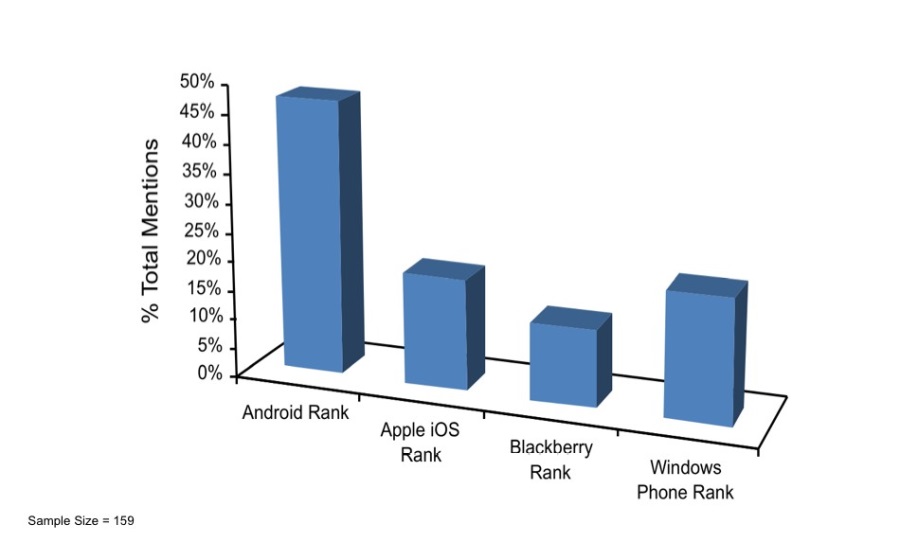



Feature Story
More feature stories by year:
2024
2023
2022
2021
2020
2019
2018
2017
2016
2015
2014
2013
2012
2011
2010
2009
2008
2007
2006
2005
2004
2003
2002
2001
2000
1999
1998
 Return to: 2015 Feature Stories
Return to: 2015 Feature Stories
CLIENT: CUPP COMPUTING
July 13, 2015: Security

When asked to rank several mobile platforms in order of security concerns, Android was consistently mentioned as the top concern. Forty-seven percent of survey-takers placed it first.
Graphic courtesy of CUPP Computing Mobile Security Multinational Decisionmakers Study 2015
IT security is complicated enough. The widespread adoption of BYOD mobile devices and the overall consumerization of IT promise to complicate security efforts exponentially. Are companies up to the challenge?
According to a recent multinational survey commissioned by CUPP Computing and conducted by Decisive Analytics, many companies are not satisfied with the mobile security they have, particularly in the face of a changing security environment. Some have yet to implement a mobile security environment at all.
Among the study's findings:
Among the security concerns expressed by IT professionals, 47 percent ranked Android devices as the top mobile security concern, followed by Windows phones (24 percent), then Apple and Blackberry devices.
In open comments, IT professionals cited cost of deployment and government intrusion as additional security concerns.
The survey indicates that IT managers are already aware that a full suite of features are necessary to protect against these novel attacks.
For example, when asked to rank a variety of mobile security features:
Interestingly, IT security managers acknowledged the importance of mobile security in cloud environments as well.
For instance:
| Priority | Percent Rating "Very High" or "Urgent" |
|---|---|
|
Achieve and maintain regulatory compliance |
66 |
|
Prevent and/or mitigate targeted attacks |
68 |
|
Secure mobile access to corporate applications in the cloud |
58 |
|
Prevent corporate data loss from mobile devices |
65 |
|
Deploy mobile anti-malware software |
59 |
The perception that a mobile security problem exists only in the U.S. is also false. The survey included responses from five countries around the world (U.S., Japan, UK, France and Germany) and found an increase in concern over targeted attacks and data breaches worldwide. The only strong point of variance was in compliance: Japanese respondents generally did not express a need for mobile security compliance reporting.
Overall, with the widespread adoption of the BYOD philosophy, mobile devices are becoming an attractive target for intrusion and sophisticated attackers everywhere. Large companies and small businesses alike are looking for the next level of protection for their sensitive corporate and customer data, for their corporate reputations, and to ensure adequate regulatory compliance.
Companies are clearly interested in a hardware-based solution to protect data on site, in the cloud and on mobile devices themselves.
Art Swift is CEO of CUPP Computing, which provides security solutions for mobile systems, such as tablets, smartphones, remote service devices and the Internet of Things (IoT). CUPP Computing is headquartered in Oslo, Norway, and has operations in Netanya, Israel, and Palo Alto, California.
Return to: 2015 Feature Stories